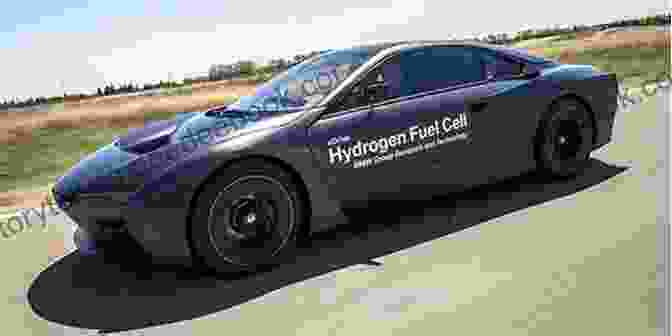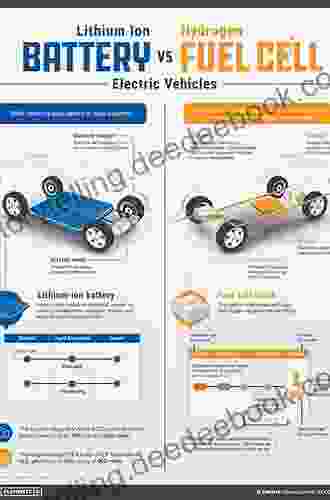Hydrogen Fuel Cells for Road Vehicles: Green Energy and Technology


5 out of 5
| Language | : | English |
| File size | : | 9614 KB |
| Text-to-Speech | : | Enabled |
| Screen Reader | : | Supported |
| Enhanced typesetting | : | Enabled |
| Print length | : | 258 pages |
Hydrogen fuel cells are gaining increasing recognition as a promising solution for decarbonizing the transportation sector. Their potential to power vehicles with zero tailpipe emissions, high efficiency, and long driving ranges makes them a compelling alternative to conventional gasoline and diesel-powered vehicles. This comprehensive article delves into the fascinating world of hydrogen fuel cells, exploring their fundamental principles, advantages, applications in road vehicles, and the challenges and opportunities they present.
How Do Hydrogen Fuel Cells Work?
Hydrogen fuel cells operate on the principle of electrochemistry, similar to batteries. They consist of two electrodes, an anode, and a cathode, separated by an electrolyte membrane. Hydrogen gas is supplied to the anode, where it undergoes a catalytic reaction with a platinum catalyst to form hydrogen ions (protons) and electrons. The protons pass through the electrolyte membrane, while the electrons are channeled through an external circuit, creating an electrical current. At the cathode, the protons react with oxygen from the air to produce water and release heat.
The electrical current generated by the fuel cell is used to power an electric motor, which drives the vehicle. The only byproduct of this process is water vapor, making hydrogen fuel cells a truly zero-emission technology.
Advantages of Hydrogen Fuel Cells for Road Vehicles
Hydrogen fuel cells offer several key advantages for road vehicles:
- Zero Tailpipe Emissions: Unlike internal combustion engines, hydrogen fuel cells produce no harmful tailpipe emissions. They release only pure water vapor, making them an environmentally friendly and sustainable choice for transportation.
- High Efficiency: Hydrogen fuel cells are highly efficient in converting chemical energy into electrical energy. They typically achieve efficiencies of 50-60%, compared to internal combustion engines with efficiencies of around 20-30%.
- Long Driving Ranges: Hydrogen fuel cells can provide long driving ranges, comparable to gasoline or diesel-powered vehicles. With a single refueling, vehicles powered by hydrogen fuel cells can travel up to 350-400 miles (560-640 kilometers).
- Fast Refueling: Hydrogen refueling is a quick and convenient process, similar to refueling a gasoline or diesel vehicle. It typically takes only a few minutes to fill a hydrogen fuel tank, making it a practical option for long-distance travel.
Applications in Road Vehicles
Hydrogen fuel cells are primarily used in passenger cars, buses, and trucks. Several major automakers, such as Toyota, Honda, Hyundai, and Mercedes-Benz, have introduced hydrogen fuel cell vehicles (FCEVs) to the market. These vehicles offer the benefits of zero emissions, long driving ranges, and fast refueling, making them a viable alternative to conventional vehicles.
In addition to passenger vehicles, hydrogen fuel cells are also being explored for use in heavy-duty vehicles, such as semi-trucks and buses. These vehicles require high power and long driving ranges, which makes hydrogen fuel cells an attractive option.
Challenges and Opportunities
While hydrogen fuel cells hold immense potential for decarbonizing the transportation sector, they also face several challenges:
- Cost: The production of hydrogen fuel cells and the establishment of hydrogen refueling infrastructure require significant investment. Reducing costs is crucial to making hydrogen fuel cells more affordable and competitive.
- Hydrogen Production: The production of hydrogen at scale is essential for the widespread adoption of hydrogen fuel cells. Currently, most hydrogen is produced from fossil fuels, which can result in greenhouse gas emissions. Developing clean and sustainable hydrogen production methods is a key challenge.
- Hydrogen Infrastructure: The lack of a comprehensive hydrogen refueling infrastructure is a major barrier to the adoption of hydrogen fuel cell vehicles. Establishing a network of hydrogen refueling stations is crucial to enable long-distance travel and convenience for drivers.
Despite these challenges, there are significant opportunities for hydrogen fuel cells in the transportation sector:
- Government Support: Governments worldwide are recognizing the potential of hydrogen fuel cells and are providing funding and incentives to support research, development, and deployment.
- Technological Advancements: Ongoing research is不断地 improving the efficiency, durability, and cost-effectiveness of hydrogen fuel cells.
- Partnerships and Collaboration: Collaboration between industry, academia, and governments is essential to overcome the challenges and accelerate the adoption of hydrogen fuel cells.
Hydrogen fuel cells hold the promise of transforming the transportation sector, offering a clean, efficient, and sustainable alternative to conventional gasoline and diesel-powered vehicles. With zero tailpipe emissions, long driving ranges, and fast refueling capabilities, hydrogen fuel cells are poised to play a significant role in decarbonizing transportation and creating a greener future. While challenges remain, the ongoing advancements in technology, government support, and strategic partnerships are paving the way for the widespread adoption of hydrogen fuel cells in road vehicles. As this technology continues to mature and evolve, it has the potential to revolutionize the way we power our vehicles and contribute to a more sustainable and environmentally friendly transportation system.
5 out of 5
| Language | : | English |
| File size | : | 9614 KB |
| Text-to-Speech | : | Enabled |
| Screen Reader | : | Supported |
| Enhanced typesetting | : | Enabled |
| Print length | : | 258 pages |
Do you want to contribute by writing guest posts on this blog?
Please contact us and send us a resume of previous articles that you have written.
 Book
Book Novel
Novel Page
Page Chapter
Chapter Story
Story Genre
Genre Reader
Reader Library
Library E-book
E-book Magazine
Magazine Newspaper
Newspaper Sentence
Sentence Shelf
Shelf Glossary
Glossary Bibliography
Bibliography Footnote
Footnote Tome
Tome Bestseller
Bestseller Classics
Classics Biography
Biography Reference
Reference Encyclopedia
Encyclopedia Dictionary
Dictionary Thesaurus
Thesaurus Character
Character Resolution
Resolution Librarian
Librarian Borrowing
Borrowing Stacks
Stacks Research
Research Scholarly
Scholarly Lending
Lending Academic
Academic Journals
Journals Rare Books
Rare Books Interlibrary
Interlibrary Study Group
Study Group Thesis
Thesis Theory
Theory Textbooks
Textbooks Jen Calonita
Jen Calonita Brian Salter
Brian Salter Perseus Filhote
Perseus Filhote Erika J Kendrick
Erika J Kendrick Leslie Moran
Leslie Moran Sheila Roberts
Sheila Roberts Daryl Gregory
Daryl Gregory Vakhtang Gogokhia
Vakhtang Gogokhia Anna Walker
Anna Walker Joan Johnson Freese
Joan Johnson Freese Matthew Soerens
Matthew Soerens Eusebiu Voinea
Eusebiu Voinea Bang Nguyen
Bang Nguyen David Carlyon
David Carlyon Ben Yagoda
Ben Yagoda Perry Shaw
Perry Shaw Maria Cecilia Galimberti Oliveira
Maria Cecilia Galimberti Oliveira Jeff Kirkham
Jeff Kirkham Janis Frank
Janis Frank Markus Jakobsson
Markus Jakobsson
Light bulbAdvertise smarter! Our strategic ad space ensures maximum exposure. Reserve your spot today!
 Neil ParkerFollow ·12.6k
Neil ParkerFollow ·12.6k Hector BlairFollow ·7.4k
Hector BlairFollow ·7.4k Albert CamusFollow ·19k
Albert CamusFollow ·19k Ian MitchellFollow ·2.3k
Ian MitchellFollow ·2.3k Roald DahlFollow ·11.7k
Roald DahlFollow ·11.7k Eli BrooksFollow ·16.5k
Eli BrooksFollow ·16.5k Francis TurnerFollow ·11.1k
Francis TurnerFollow ·11.1k Colt SimmonsFollow ·5.4k
Colt SimmonsFollow ·5.4k

 Howard Blair
Howard BlairClassical Music Themes for Easy Mandolin, Volume One
Classical Music Themes for Easy Mandolin,...

 Paulo Coelho
Paulo CoelhoThe Heretic Tomb: Unraveling the Mysteries of a Lost...
Synopsis In Simon Rose's captivating debut...

 Rodney Parker
Rodney ParkerThe Passionate Friends Annotated Wells: A Deeper...
Unveiling the...

 Ed Cooper
Ed CooperDelicious Stories of Love, Laughs, Lies, and Limoncello...
In the heart of...

 Elmer Powell
Elmer PowellHal Leonard Piano For Kids Songbook: Unleashing the...
Music holds immense...
5 out of 5
| Language | : | English |
| File size | : | 9614 KB |
| Text-to-Speech | : | Enabled |
| Screen Reader | : | Supported |
| Enhanced typesetting | : | Enabled |
| Print length | : | 258 pages |














